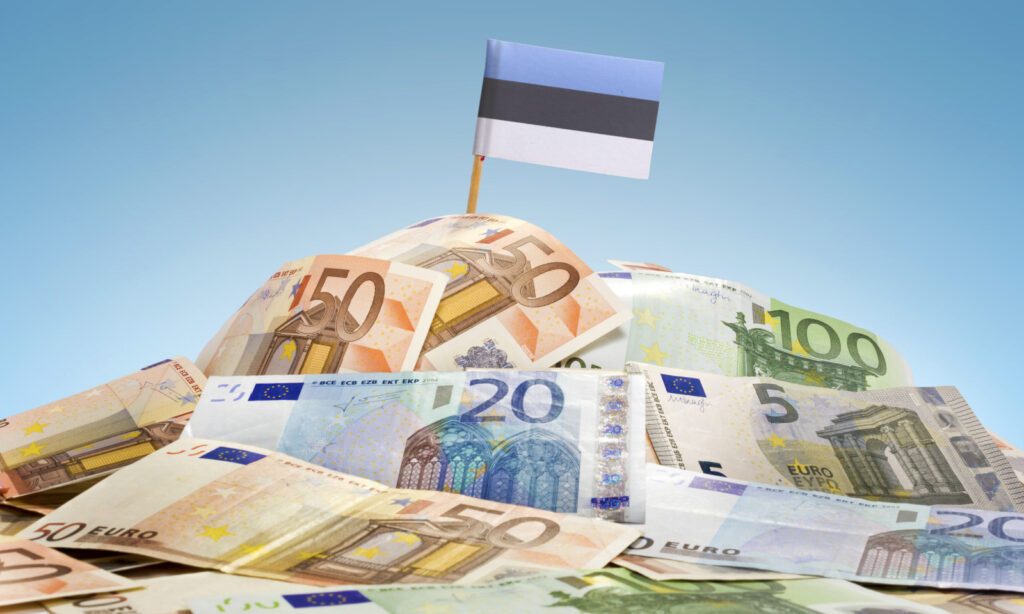Creditinfo’s Account Information Service Product

In the spring of 2021, the Estonian Financial Supervision Authority authorized Creditinfo Estonia to offer Account Information Service in the Estonian market. In the autumn of 2021, the Estonian Financial Supervision Authority also granted the authorization to provide Account Information Service to the Latvian and Lithuanian markets. This act added to our product portfolio a new, exciting product that benefits our customers in the short and long run. As of today, we have had the Account Information Service in our cross-Baltic product portfolio for two years.
About the Account Information Service
The opportunity to provide Account Information Service emerged when the European Union (EU) Parliament and the EU Council adopted a new directive regulating payment services in the EU internal market on November 25, 2015 (PSD2), which emphasized the expansion of open banking in Europe.
Open Banking refers to provide third-party financial service providers open access to transactional data of bank and financial institution customers, using secure data transmission channels and customer consent.
The Account Information Service is a part of the Open Banking initiative, defined as an online service where the service user (customer) is identified and authenticated via strong identification and authentification means. The service itself means transmitting customer’s bank account data through a secure channel to third party from whom the customer wishes to apply a credit product.
How does Creditinfo provide the Account Information Service?
Using Creditinfo Estonia’s solution, both individuals, which is regulated by the aforementioned payment service directive, and companies can transmit their account information to third parties.
Beside financial sector the possibilities of the Account Information Service can be successfully used in application processes in various sectors. Previously mentioned customer consent is obviously obligatory.
Different sectors that can benefit from account information:
- Public sector companies that provide subsidies to individuals and businesses, where the information in the account details creates significant value when determining subsidies;
- Insurance sector companies, which can use behavioral information from the bank account for determining insurance premiums or simplifying the insurance incident evidence burden;
- Other sectors where value from account information help to create better personalized offers for their products and services.
The strength of our Account Information Service is categorization.
The greatest value of the Account Information Service provided by Creditinfo Estonia comes from categorizing account transactions, which our clients (data recipients) can conveniently use in their business decisions.
Categorization is a solution that can and should be continuously improved over time. Precise and detailed categorization is a top priority for Creditinfo Estonia’s Account Information Service.
The data from the Account Information Service serves also as an input for our Account Information Service Report. The report helps to make more informed business decisions both internally and towards our client’s customers. The report highlights all the key ratios, indicators, “green and red flags” and much more that can be extracted from account information.
The report is designed in a way that can be customized to meet the client’s needs, which make it a tool for everyday business decisions.
More information about the service: https://creditinfo.ee/en/avoid-debts/psd2/
How are sanctions created? Overview on the example of the European Union

Even if it turns out later in the proceedings that you have behaved correctly, it is in no way reasonable to attract such negative media coverage; as well as experiencing the stress and resource consumption inevitably associated with such procedures. Therefore, it is always wise to prevent problems and look for solutions to mitigate such risks as early as possible, which AS Creditinfo Eesti can always help you with.
However, how are restrictive measures established, who is responsible for the fact that the EU can put someone on its lists at all, and is it inevitable to be on the sanctions lists or is it possible to get out of there somehow? Let’s take a closer look at this process here.
Initiation of sanctions in the European Union
The European Union is an association of independent countries operating on the basis of its founding treaty(s). One of the important principles is that the European Union has a common foreign and security policy, one of the important parts of which is, among other things, the imposition of sanctions in situations where it is desired :
- protect EU values, fundamental interests and security
- keep the peace
- consolidate and support democracy, the rule of law, human rights and the principles of international law
- prevent conflicts and strengthen international security
We have already covered the nature of sanctions and their relevance in relation to the situation in Ukraine in more detail on the Creditinfo channels beforehand, so we would currently only look at the process of how the idea of sanctioning at the EU level results in a mandatory legal act for all persons operating on the territory of the Community.
The creation of legislation necessary for the implementation of sanctions can be viewed at the EU level in three different aspects :
- Legislation to take over UN sanctions is being created
- Legislation is being created to implement UN sanctions in an expanded form
- Legislation to establish autonomous EU sanctions regimes.
The European Foreign Service (institutionally part of the European Union Commission) is responsible for the implementation of EU sanctions policy , whose responsibility is to prepare drafts for establishing or changing sanctions regimes.
Of course, this is done in close cooperation with the member states, for example it is very important to get input regarding the identifying data of sanctioned persons, which information is often available to national specialists, and including it in the legislation establishing the sanction (or its annex) will help to significantly reduce the number of false positive responses arising from the implementation of the legislation in the future.
Since all member states must give their consent to the imposed sanctions, the draft sanctions move to the institution with the member states’ representation, i.e. the Council of the EU. The next instance is therefore the corresponding working group of the Council of the European Union (RELEX) , where the specialists of the member states cooperate to reach an agreement on the text of the legislation.
If agreement is not reached, the agreement will continue in the working group formed by the permanent representatives of the member states at the EU (COREPER) , from there the draft will go to the General Assembly of the Council of the EU (forum of heads of government), where it will be adopted and the text of the legislation will be agreed upon. For mandatory compliance, the legislation will be in the EU gazette after its publication.
Ending sanctions
Existing EU autonomous sanctions legislation is reviewed regularly, but no less often than once every 12 months.
Since the EU follows the principles of the rule of law (Rule of Law), it is of course also possible for persons under sanctions to get rid of the status of a sanctioned person through legal processes.
There are two main options for this – to publish a motivated statement of wish to this effect directly to the Council of the EU, which will then process the corresponding application and make a decision regarding whether to leave the sanctions list or to remove it from it, or another, more widely used option, to turn to the General Court of the European Union ( General Court of the European Union).
For example, at this point it is perhaps even appropriate to bring up the most talked about decision of recent times about the victory achieved by Violetta Prigozhin, the mother of the late Yevgeni Prigozhin, regarding her delisting .
AS Creditinfo Eesti has continued to take on the concern of providing the necessary support to market participants in the implementation of international sanctions, and we are ready to help with various issues, both with advice and force. We believe that in this way, in cooperation with our customers, we can best contribute to the achievement of the common foreign and security policy goals of the EU.
Visit: creditinfo.ee
Creditinfo: “The BIC reform will make it possible to take a big step towards financial inclusion.”

Reform of BICs, impact of inflation on solvency, feedback from the Checkinfo service – an overview with Sidimohamed Abouchikhi, Regional Director for Francophone Africa of Creditinfo Group, and Director of the Board of Directors of Checkinfo.
Finance News Hebdo: In this inflationary context, what assessment do you make of individuals’ and businesses’ insolvency risks?
Article translated in English as first seen on Finance News Hebdo For more inofmormation visit: www.checkinfo.ma
Creditinfo designated “High Overall Maturity Score” ESG rating by Anthesis

Retrospective of the semi-annual statistics of the Register of Payment Failures in Estonia

The Payment Default Register managed by Creditinfo Eesti reflects the debts of private individuals and companies and thus helps to make smart credit decisions. It is the first and oldest register containing debt data, which was established in 2001 by Estonian banks.
There are tens of thousands of people with payment defaults in Estonia
As of the end of the first half of 2023, there were 57,694 individuals with valid payment defaults. Compared to the period a year ago, the number decreased a bit.
When the debt is liquidated, the current payment default is marked as closed – at the end of the first half of 2023, there were 109,766 private individuals with closed payment defaults.
A closed default shows that the debt has been paid, but at the same time it gives the creditor a warning that the person has had problems paying bills in the past and it allows for a more accurate assessment of their creditworthiness. In the case of private individuals, closed payment defaults are published for up to 5 years after the payment default has ended.
The number of companies with payment defaults is increasing
As of the end of the first half of 2023, there were 21,121 legal entities or companies-institutions with valid payment defaults. Thus, there has been an increase of 3.3% compared to last year.
There were 32,836 legal entities with closed payment defaults. In the case of companies, the information provided will be published for another 7 years after the closing of the payment default.
There are more than 150 thousand active payment defaults in the Register
There were 128,405 active payment defaults in the Payment Default Register of private individuals at the end of the first half of the year. The closed payment defaults for private individuals with payment defaults reached to 350,120.
There were 44,472 active defaults of legal entities at the end of the first half of the year. There were 65,816 closed defaults of legal entities.
The number of active payment defaults has increased
In total, there were 172,877 active payment defaults published in the Payment Default Register. If one also adds information of closed payment defaults, the total number of payment defaults in the Payment Default Register is 588,832, which has increased by approx. 6.6% compared to the end of 2022.
By Creditinfo Estonia.
Visit: www.creditinfo/ee/en
Risk Management Framework

Risk management is an essential function for any bank, as it helps to protect the bank’s financial position, reputation, and long-term viability. An effective risk management framework consists of several key components that work together to identify, assess, and manage risks.
Risk Governance
The first key component of an effective risk management framework is risk governance. This involves establishing clear risk management policies, procedures, and guidelines that align with the bank’s overall strategy and objectives. The bank’s board of directors and senior management should be actively involved in setting risk management policies and overseeing the bank’s risk management activities.
Risk Identification
The second key component is risk identification. The bank should have a comprehensive risk identification process in place to identify all potential risks associated with its business activities, products, and services. This includes identifying internal and external risks such as credit risk, operational risk, market risk, and compliance risk.
Risk Assessment
Once risks are identified, the bank should assess the likelihood and impact of each identified risk to determine its potential impact on the bank’s overall operations, financial position, and reputation. This includes assessing the potential impact of risks on the bank’s customers, employees, and other stakeholders.
Risk Mitigation
The bank should develop and implement risk mitigation strategies to manage and reduce the likelihood and impact of identified risks. This may include implementing internal controls, establishing risk limits, and developing contingency plans.
Risk Monitoring
An effective risk management framework should include ongoing risk monitoring to ensure that the framework is functioning as intended. This involves continuously monitoring the bank’s risk management activities to identify emerging risks and ensure that existing risks are being effectively managed.
Risk Reporting
The bank should have a robust risk reporting framework in place to provide timely and accurate information on risk exposures and mitigation activities to the board of directors, senior management, and other stakeholders. Effective risk reporting helps ensure that the bank’s management team has the information they need to make informed decisions about risk management activities.
Risk Culture
Finally, an effective risk management framework should foster a risk-aware culture throughout the organization. This involves ensuring that all employees understand their roles and responsibilities in managing risks and are held accountable for their actions. A strong risk culture helps to ensure that risk management activities are integrated into the bank’s day-to-day operations.
In conclusion, an effective risk management framework is essential for banks to identify, assess, and manage risks. The key components of such a framework include risk governance, risk identification, risk assessment, risk mitigation, risk monitoring, risk reporting, and risk culture. By implementing an effective risk management framework, banks can effectively manage risks and protect their financial position, reputation, and long-term viability.
Joe Bowerbank,
Business Development, Creditinfo Group.
Digital Transformation in Credit Risk Management: What You Need to Know

The rise of digital technologies is transforming the financial industry, and credit risk management is no exception. With the increasing use of digital channels for financial transactions, there is a growing need for credit risk management strategies that can effectively manage risks in these channels. In this blog post, we will explore the concept of digital transformation in credit risk management and discuss some of the key trends and best practices in this area.
What is Digital Transformation in Credit Risk Management?
Digital transformation in credit risk management involves the use of digital technologies to manage credit risk more effectively. This includes the use of advanced analytics and machine learning to analyze large amounts of data in real-time, as well as the development of digital platforms that enable faster and more efficient credit risk management processes.
One of the key benefits of digital transformation in credit risk management is the ability to analyze data more effectively. By using advanced analytics and machine learning algorithms, financial institutions can analyze large amounts of data in real-time, identifying trends and patterns that may be indicative of credit risk. This can help financial institutions make more informed lending decisions, reducing the risk of default on loans and other credit products.
Another benefit of digital transformation in credit risk management is the development of digital platforms that enable faster and more efficient credit risk management processes. For example, some financial institutions are developing digital platforms that enable borrowers to apply for loans online, with the platform automatically analyzing the borrower’s credit risk and providing a decision in real-time. This can significantly reduce the time and cost associated with traditional lending processes, making it easier for borrowers to access credit.
Key Trends and Best Practices in Digital Transformation in Credit Risk Management
There are several key trends and best practices in digital transformation in credit risk management that financial institutions should be aware of:
Use of advanced analytics and machine learning: Financial institutions should leverage advanced analytics and machine learning algorithms to analyze large amounts of data in real-time, identifying trends and patterns that may be indicative of credit risk.
Development of digital platforms: Financial institutions should develop digital platforms that enable faster and more efficient credit risk management processes. These platforms should be user-friendly and easy to access, making it easier for borrowers to apply for loans and access credit.
Integration with other digital platforms: Financial institutions should integrate their credit risk management platforms with other digital platforms, such as mobile banking apps and online marketplaces, to provide a seamless and integrated experience for borrowers.
Investment in cybersecurity: Financial institutions should invest in cybersecurity measures to protect against cyber threats and ensure the security of customer data.
Conclusion
Digital transformation is transforming the financial industry, and credit risk management is no exception. By leveraging digital technologies such as advanced analytics, machine learning, and digital platforms, financial institutions can manage credit risk more effectively, reducing the risk of default on loans and other credit products. As the financial landscape continues to evolve, it is likely that new digital technologies and best practices will emerge, requiring credit risk management professionals to stay up-to-date with the latest trends and developments.
Gary Brown,
Head of Commercial Development, Creditinfo Group.
Credit Bureaus: Cross Border Data Sharing

In today’s globalized world, cross-border data sharing is becoming increasingly important for credit bureaus. By accessing data from multiple countries, credit bureaus can improve the accuracy and completeness of credit reports, assess the creditworthiness of non-citizens, and expand market opportunities for lenders. Let’s explore these benefits in more detail.
Improved accuracy and completeness of credit reports
Accessing data from multiple countries allows credit bureaus to gain a more comprehensive view of an individual’s credit history. For example, if someone has lived or worked in multiple countries, their credit history may be spread across different credit bureaus. Cross-border data sharing allows credit bureaus to combine this information into a single credit report, providing lenders with a more complete picture of the borrower’s creditworthiness. This can lead to more informed lending decisions and better risk management for lenders.
Assessment of creditworthiness for non-citizens
For non-citizens or individuals with limited credit histories, cross-border data sharing can be especially important. Without access to credit data from other countries, it can be difficult to assess their creditworthiness. Cross-border data sharing allows credit bureaus to access credit data from other countries, providing a more complete picture of the borrower’s credit history. This can help lenders make more informed lending decisions, expanding opportunities for creditworthy borrowers.
Increased market opportunities for lenders
By accessing data from multiple countries, credit bureaus can also help lenders expand into new markets. For example, a lender in one country may be interested in providing loans to individuals or businesses in another country. Without access to credit data from that country, it can be difficult to assess the creditworthiness of potential borrowers. Cross-border data sharing can provide lenders with the information they need to make informed lending decisions, opening up new opportunities and expanding their market reach.
Compliance with international regulations
In some cases, cross-border data sharing may be required by international regulations or agreements, such as the GDPR in the European Union. By complying with these regulations, credit bureaus can avoid legal and reputational risks. Additionally, complying with international regulations can help build trust with consumers and businesses, as it shows a commitment to ethical and responsible data practices.
In conclusion, cross-border data sharing is becoming increasingly important for credit bureaus. By providing access to a wider range of data sources, credit bureaus can improve the accuracy and completeness of credit reports, assess the creditworthiness of non-citizens, expand market opportunities for lenders, and comply with international regulations. As global data sharing becomes more common, it is likely that cross-border data sharing will become a standard practice for credit bureaus around the world.
Credit Bureaus and why they will remain important in the years to come

As the financial industry continues to evolve, credit bureaus need to continue to adapt. There are many compelling reasons why credit bureaus will continue to play a vital role in the future of lending and credit. In this blog, we’ll explore the benefits of credit bureaus and why they will remain important in the years to come.
1. Efficient and standardized credit data
Credit bureaus provide an efficient and standardized way to collect and store credit data. This allows lenders to quickly access the credit history and credit scores of potential borrowers, which is essential for making informed lending decisions. Without credit bureaus, lenders would need to spend more time and resources gathering credit data from various sources, which would slow down the lending process.
2. More accurate credit models
Credit bureaus are constantly refining their credit models to improve accuracy and predictiveness. By analysing large amounts of credit data, credit bureaus can develop more sophisticated credit models that consider a wide range of factors, such as payment histories, outstanding debts, and length of credit history. These models provide lenders with a more accurate picture of a borrower’s creditworthiness, helping to reduce the risk of defaults and delinquencies.
3. Increased access to credit
Credit bureaus play a critical role in expanding access to credit. By providing lenders with access to credit data, credit bureaus make it easier for individuals and businesses to obtain loans and credit cards. This is particularly important for people with limited credit histories or who have had past credit problems, as credit bureaus provide lenders with a way to evaluate these borrowers’ creditworthiness.
4. Protection against fraud and identity theft
Credit bureaus also play a key role in protecting consumers against fraud and identity theft. By monitoring credit reports for suspicious activity, credit bureaus can help detect and prevent fraudulent activity. Additionally, credit freezes and fraud alerts can be placed on credit reports to prevent unauthorized access to credit data.
5. Continued relevance in a changing industry
While the financial industry is evolving rapidly, credit bureaus will continue to be relevant in the future. As new technologies and data sources emerge, credit bureaus will adapt and incorporate these changes into their credit models. Additionally, credit bureaus will likely face increased competition from fintech startups and other companies, which will push them to innovate and improve their offerings.
In conclusion, credit bureaus are essential to the lending and credit industry. By providing lenders with access to credit data, credit bureaus make it easier for individuals and businesses to obtain loans and credit cards. Additionally, credit bureaus play a critical role in expanding access to credit, protecting consumers against fraud and identity theft, and adapting to a changing industry. As the financial industry continues to evolve, credit bureaus will remain a vital part of the lending and credit ecosystem.
Gary Brown,
Head of Commercial Development, Creditinfo Group.
Creditinfo Kenya partners with Letshego Kenya to launch lending app

Letshego Kenya launches “Letsgo Cash” in partnership with Creditinfo Kenya to take financial inclusion to a higher level.
· Minimum loan amount of KES 1,000 and a maximum of KES 100,000 and a loan repayment period of 30 days.
· LetsGo Cash increases access and supports customers who need quick and easy access to funds for emergency purposes.
· LetsGo Cash supports digital financial inclusion and enables the underserved and informal sector players to build their own credit records.
Nairobi, Kenya, 3rd May 2023 – Letshego Kenya Limited, a subsidiary of Letshego Holdings Limited (Letshego Group), has partnered with Creditinfo Kenya to launch LetsGo Cash, a self-service and short-term instant loan that gives customers access to KES 1,000 up to KES 100,000.
LetsGo Cash is payable in 30 days and geared towards consumers who need quick and easy access to funds for emergency purposes, including family emergencies, medical needs, home repairs, car breakdowns or funds to support entrepreneurs and small businesses. Creditinfo Kenya’s team brings decades of experience and practical knowledge in credit risk management to support the delivery of LetsGo Cash.
Letshego Kenya’s Chief Executive Officer, Adam Kasaine said: “LetsGo Cash is another way we are increasing access to product funds for more Kenyans. This is inclusive finance in action – it’s quick and hassle-free cash at a competitive price, accessible via your phone or web.”
The innovative LetsGo Cash is a potential game-changer, as it is accessible anytime, anywhere and is more competitive than traditional short-term cash advance providers, providing customers with immediate financial relief and the opportunity to participate in the digital economy in a sustainable and responsible manner.
Creditinfo’s Regional Manager for East Africa, Kamau Kunyiha added: “Creditinfo is proud to support LetsGo Cash assist customers who need quick and easy access to emergency funds the most, while also helping the underserved to build their own credit scores at the same time. Customers’ applications are submitted with a few swipes on a mobile phone, and the time to cash can be as short as a few minutes.”
LetsGo Cash provides a convenient, safe and affordable financial service to the underserved and informal sector players thereby helping to increase financial inclusion. It also helps them build their own credit record, since the better they manage their loan, the better their credit record, and the more cash they have access to going forward. This ensures that more people can access the service, including first-time borrowers who can now enjoy the benefits of a secure, regulated lending solution. Once approved, the money is disbursed directly into the customer’s mobile wallet. It can then be used as the customer desires, including for emergencies, such as purchasing prepaid electricity and water, paying bills, or sending money to friends and family.
LetsGo Cash can be accessed on Letshego’s LetsGo Digital Mall and downloadable via Android and Apple Play Store, or with one click, clicking on www.letsgo.letshego.com as well as via the USSD *435# on their mobile phone.
-ENDS-
NOTES TO EDITORS:
About Letshego Kenya Limited
Letshego Kenya Limited is the largest credit-only microfinance institution in Kenya and a licensed financial services provider in Kenya, providing loans to individuals across both the public and private sectors, as well as supporting Micro and Small Entrepreneurs (MSE). Since the conclusion of the successful acquisition by Letshego Holdings Ltd in February 2012, Micro Africa Group became a wholly owned subsidiary of Botswana-based Letshego Holdings Limited – an inclusive finance group with more than 21 years’ experience in Africa, and a current footprint of 11 Sub-Saharan Markets. Its contribution to the group has been to leverage the microfinance banking competencies and existing customer base, expand Letshego’s geographic coverage, and diversify its solution offering.
The company is founded on, and continues to strive towards, the principle of finding the most effective way to implement microfinance banking in an African context and transform the livelihoods of customers who carry out viable economic activity. Letshego Kenya Limited has a staff compliment of over 150 employees, spread across 25 branches. The company provides loans to over 20,000 customers who enjoy an expanded access through strategic partnerships, innovative technology and digital delivery channels. For more information on Letshego, please visit www.letshego.com/kenya
About Creditinfo
Established in 1997 and headquartered in London, UK, Creditinfo is a provider of credit information and risk management solutions worldwide. As one of the fastest-growing companies in its field, Creditinfo facilitates access to finance, through intelligent information, software and decision analytics solutions.
With more than 30 credit bureaus running today, Creditinfo has the most considerable global presence in the field of credit risk management. For decades it has provided business information, risk management and credit bureau solutions to some of the largest, lenders, governments and central banks globally to increase financial inclusion and generate economic growth by allowing credit access for SMEs and individuals.
For more information on Creditinfo, please visit www.creditinfo.com




